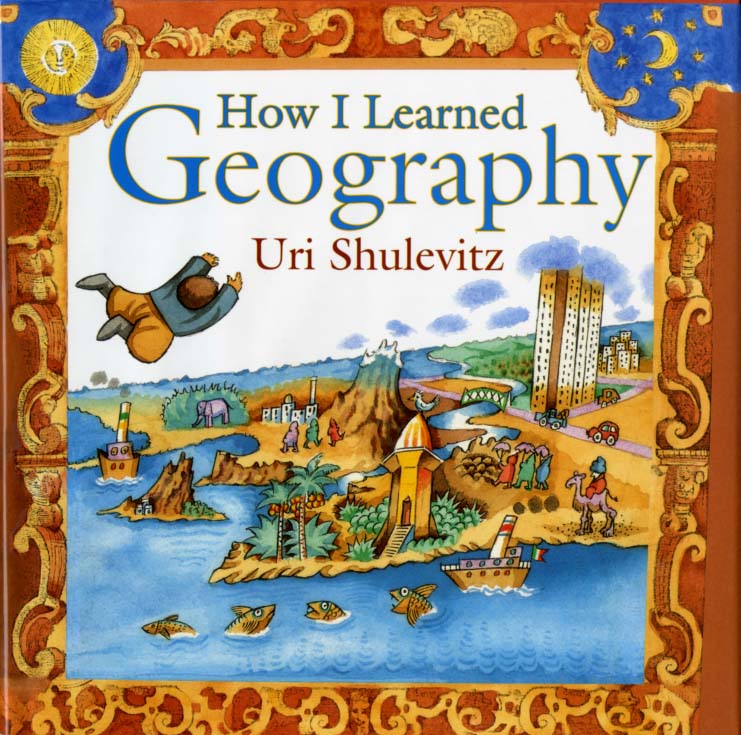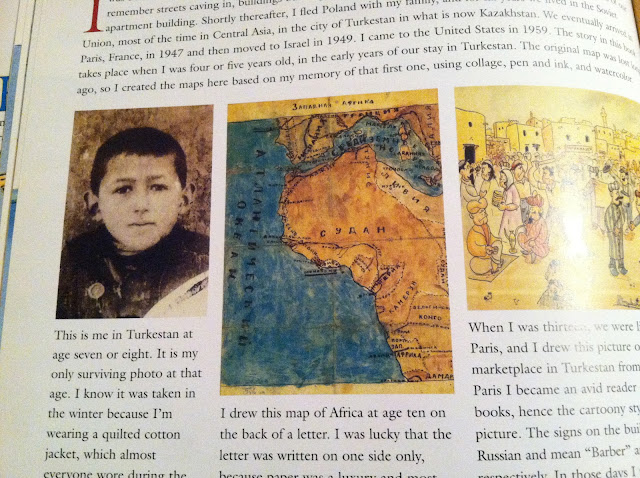 Uri Shulevitz is a hard person for me to write about because he has written and/or illustrated a very large number of books about which I have drastically different opinions, but I'll just focus on this one. I think this is by far the best book Shulevitz has written.
Uri Shulevitz is a hard person for me to write about because he has written and/or illustrated a very large number of books about which I have drastically different opinions, but I'll just focus on this one. I think this is by far the best book Shulevitz has written.How I Learned Geography is an autobiographical story from the time when Shulevitz was a little boy. His home in Warsaw was bombed during the war, and his family escaped to Kazakhstan where they survived. While in Kazakhstan they had very little money for food, and one day his father went off to the market to buy bread, and instead spent all the food money on an enormous map of the world. The family went to bed hungry, listening to the neighbors eat their bread, but the next day, the map went up on the wall, and little Uri discovered the magic and the salvation offered by this new object. He started to "travel" all over the world in his imagination, making up poems from all the strange names on the map, drawing parts of the map on precious bits of paper that came his way, and in many ways using this object as a means of surviving starvation, loneliness and uncertainty.
The first big reason I love this book is because I love maps most of all. I don't know if I would have had the strength to buy a map instead of food if I was in the father's place, but I certainly would hope so. There is something so profoundly familiar in this act, I feel like the characters in the book are a part of my family.
The second reason I love this book is because it deals with WWII and indirectly with the Holocaust (Shulevitz is Jewish, of course) in a very subtle, personal and honest way, without using those two events to blow up one's self-importantce, in way that most books, movies, poems and art works by people not connected to the events do. This is why I generally refuse to have anything to do with them, and find the activity of using the Holocaust to promote one's art or writing truly appalling, a cheap and indecent way to get extra points without making the work good in it's own right. This book is one of the few exceptions to this phenomenon that I have seen, and I very much respect Shulevitz for talking about his experiences in the way that he does, as someone who actually experienced it, not someone who merely observed and was "affected".
Third, both the text and the pictures are superb. In my opinion Shulevitz has often unsuccessfully tried to be poetic with his texts which made his stories boring and meaningless, and it is definitely not the case with this story. Probably because he is actually describing real events, the plot is strong and well structured, and he is very successful at using a few words to convey a lot of meaning. The illustrations are also some of his strongest. Maybe because he is going back to the place of his childhood imagination, and also visually recalling childhood memories, the pictures are exciting, emotional, diverse, dynamic, colorful and engaging.
My last and most favorite part of this book is the very last page, the one that comes after the story is over. On that page there is an autobiographical note describing the actual events on which the story is based, a photograph of a map Shulevitz drew as a child on the back a letter, a comic he drew as a teenager when after the war the family lived in Paris, and, a photo of Shilevitz as a little boy. I especially appreciate the photo of the author as a child, as that puts the book into an elect group of examples of children's literature that touches on the idea that adults and children do not necessary need to exist in two different and separate worlds. The other two books that are quite dear to me, include the Little Prince with its dedication to Leon Werth (friend of the author) when he was a little boy, and Korczak's King Matt the First, with a photo of Korczak as a boy on the first page.
This is a special and important book for grown-ups that used to be children, and for children who plan to become good grown-ups.

No comments:
Post a Comment